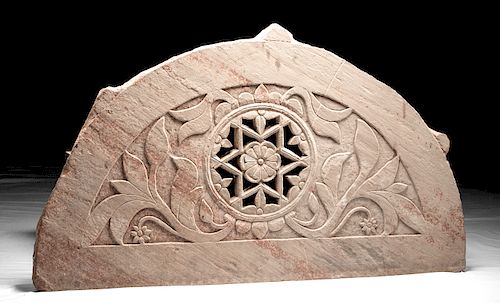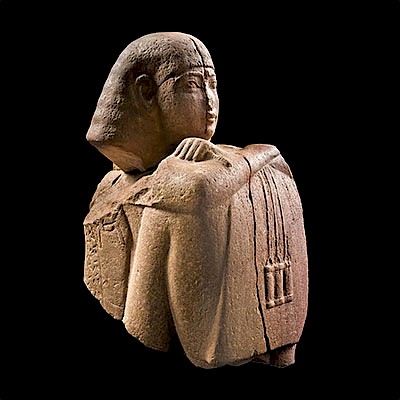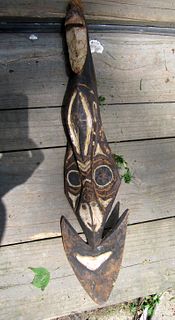17th C. Indian Mughal Sandstone Lintel w/ Openwork
Lot 124c
About Seller
Artemis Gallery
686 S Taylor Ave, Ste 106
Louisville, CO 80027
United States
Selling antiquities, ancient and ethnographic art online since 1993, Artemis Gallery specializes in Classical Antiquities (Egyptian, Greek, Roman, Near Eastern), Asian, Pre-Columbian, African / Tribal / Oceanographic art. Our extensive inventory includes pottery, stone, metal, wood, glass and textil...Read more
Categories
Estimate:
$4,000 - $6,000
Absentee vs Live bid
Two ways to bid:
- Leave a max absentee bid and the platform will bid on your behalf up to your maximum bid during the live auction.
- Bid live during the auction and your bids will be submitted real-time to the auctioneer.
Bid Increments
| Price | Bid Increment |
|---|---|
| $0 | $25 |
| $300 | $50 |
| $1,000 | $100 |
| $2,000 | $250 |
| $5,000 | $500 |
| $10,000 | $1,000 |
| $20,000 | $2,500 |
| $50,000 | $5,000 |
| $100,000 | $10,000 |
| $200,000 | $20,000 |
About Auction
By Artemis Gallery
Sep 26, 2019
Set Reminder
2019-09-26 10:00:00
2019-09-26 10:00:00
America/New_York
Bidsquare
Bidsquare : Exceptional Day 1: Antiquities & Asian Art
https://www.bidsquare.com/auctions/artemis-gallery/exceptional-day-1-antiquities-asian-art-4437
Day 1 of an important 2-day auction featuring exceptional, museum-worthy examples of Egyptian, Greek, Etruscan, Roman, Viking, Russian, Near Eastern, as well as Asian Art from China, Japan, Thailand, Vietnam, Burma and India. Artemis Gallery info@artemisgallery.com
Day 1 of an important 2-day auction featuring exceptional, museum-worthy examples of Egyptian, Greek, Etruscan, Roman, Viking, Russian, Near Eastern, as well as Asian Art from China, Japan, Thailand, Vietnam, Burma and India. Artemis Gallery info@artemisgallery.com
- Lot Description
Central Asia, India, Mughal Empire ca. 17th century CE. Made from a beautifully banded red and ecru colored sandstone, this is a gracefully carved semicircle lintel from an elite home, temple, or mosque. At its center is a ten-petaled flower inside an openwork six-pointed star. This, in turn, is set within an openwork circle with further floral flourishes. Surrounding this inside a thick border are shallow reliefs of symmetrical, sinuous leaves, vines, and, low in the carving, two delicate flowers. Size: 1.5" L x 42" W x 23.75" H (3.8 cm x 106.7 cm x 60.3 cm)
Mughal period architecture was a blend of Islamic, Persian, Turkish, and native Indian styles from earlier periods. Towering, slender minarets, bulbous, onion-like domes, large curved gateways, and ornate, symmetrical decorative programs characterize the imaginative and monumental buildings of the period, of which the Taj Mahal is of course the most famous. This reached its peak during the reign of Emperor Shah Jahan, who in addition to the Taj Mahal created the Diwan-I-Am (Hall of Public Audience) and the Moti Masjid (Pearl Mosque). Sadly these extravagant achievements heavily taxed the Mughal people, and by Jahan's death, he had bankrupted his empire. The combination of wealth and artistic patronage of the Mughal period remains unparalleled in Indian history.
Provenance: private J.H. collection, Beaverton, Oregon, USA
All items legal to buy/sell under U.S. Statute covering cultural patrimony Code 2600, CHAPTER 14, and are guaranteed to be as described or your money back.
A Certificate of Authenticity will accompany all winning bids.
We ship worldwide and handle all shipping in-house for your convenience.
#149609Small repair on lower edge; this is well done and unobtrusive. There are a few scratches, chips, and nicks commensurate with age as well as small losses to the peripheries. Nice deposits on surface.Condition
- Shipping Info
-
All shipping is handled in-house for your convenience. Your invoice from Artemis Gallery will include shipping calculation instructions. If in doubt, please inquire BEFORE bidding for estimated shipping costs for individual items.
-
- Buyer's Premium



 EUR
EUR CAD
CAD AUD
AUD GBP
GBP MXN
MXN HKD
HKD CNY
CNY MYR
MYR SEK
SEK SGD
SGD CHF
CHF THB
THB














